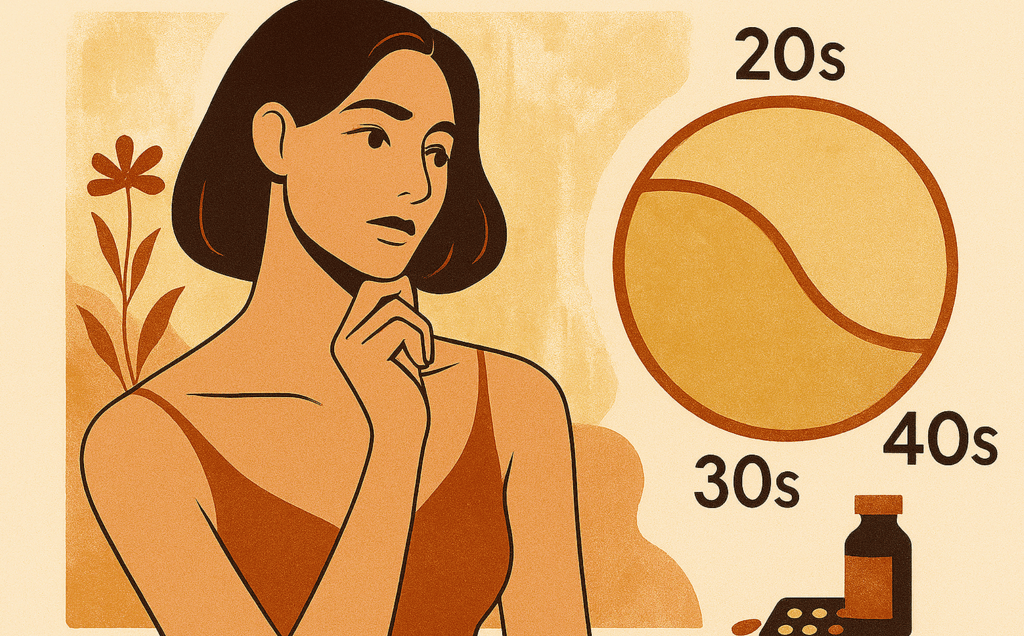How Fertility Changes with Age: What to Know in Your 20s, 30s & 40s
Wondering how age affects fertility? Learn what really happens to eggs, sperm and IVF success rates over time — in this gentle, science-based guide.
DIAGNOSIS & TESTING


We grow older every day — but when you're trying to conceive, age can feel like a deadline. Whether you’re in your late twenties or approaching your forties, understanding how fertility changes with age can help you make informed decisions and feel more in control of your future.
In this post, we’ll explore the real science behind age and fertility — for both women and men — and explain how IVFcan support people at different life stages. This isn’t about panic or pressure. It’s about information, empowerment, and understanding the timeline.
Female Fertility and Age: What Happens, When?
Female fertility is directly linked to egg quantity and quality, both of which decline with age — gradually at first, and then more rapidly.
The General Fertility Timeline:
Early 20s–Late 20s: Peak fertility years
Age 30: Slight decline begins
Age 35: Fertility starts to drop more sharply
Age 38–40: Fertility significantly declines; egg quality decreases
Age 43+: Natural conception becomes rare; IVF success rates lower
A woman is born with all the eggs she’ll ever have — around one to two million. By puberty, she has about 300,000–400,000 left, and only around 300–400 will ever mature during her reproductive years. Egg quality also worsens with time, increasing the risk of miscarriage or chromosomal abnormalities.
👉 Learn more: What Is AMH and Why Does It Matter?
What About Male Fertility and Age?
Male fertility declines more slowly, but age still matters. While men can technically father children into older age, sperm quality and DNA integrity decline after 40–45.
This can lead to:
Lower fertilisation rates
Increased time to pregnancy
Higher risk of miscarriage
Greater chance of certain health conditions in offspring
Male factor infertility is present in 50% of cases. It's important for both partners to be tested early — fertility is not just a “female issue.”
👉 Related: Male Factor Infertility: What Tests Are Done?
IVF and Age: What the Data Says
One of the most common myths is that IVF can "override" age-related infertility. While IVF can help, especially with mild or unexplained infertility, it cannot completely reverse the effect of ageing on eggs or sperm.
IVF Success Rates by Age (Female) – UK Averages:
Under 35: ~32–35% per embryo transfer
35–37: ~25–29%
38–39: ~19–23%
40–42: ~11–15%
43–44: ~5%
Over 44: Less than 2%
Success rates are higher with donor eggs, especially for people over 42. The same applies for donor sperm in cases of severe male factor infertility.
👉 Already published: IVF Success Rates by Age
Should You Consider Egg Freezing?
Egg freezing is becoming more popular in the UK, especially for people in their 20s and early 30s who aren't ready to conceive yet. It preserves egg quality, not just quantity — making it more likely you'll have viable eggs later on, even if your natural fertility has declined.
Things to consider:
It's most effective before age 35
It doesn’t guarantee pregnancy later
It can be emotionally and financially demanding
👉 Coming soon: [Should I Freeze My Eggs? A UK Guide]
What About Men Freezing Sperm?
Sperm freezing is:
Cheaper
Less invasive
Can preserve fertility for men undergoing cancer treatment or transitioning genders
Still affected by age-related DNA damage, but less dramatically
It’s a simple option worth considering for those facing medical treatment or lifestyle delays.
What Should You Do if You're 35+ and Trying?
If you're over 35 and haven’t conceived after 6 months, it’s time to speak to your GP. You don't need to wait the standard 12 months.
Your next steps:
Track ovulation and cycles carefully
Get tested (hormones, semen analysis, scans)
Ask for a referral to a fertility clinic
Consider IVF if no cause is found, or if age is the main factor
👉 Read next:
Fertility Tests: What to Expect and What They Mean
Is It Time to Get Help? Recognising the Signs of Infertility
Gentle Advice
It’s never “too late” to care about your fertility
Try not to compare your journey to others
Knowledge is power — but timing is key
If you’re feeling overwhelmed, you're not alone. Age might be a factor, but it doesn’t define your future.
© 2025. All rights reserved.
